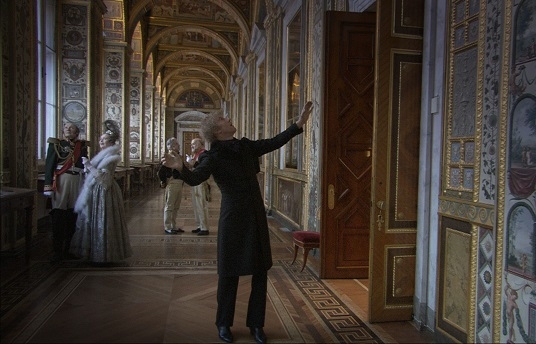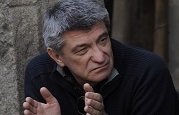Russian Ark
Modern Masters

Aleksandr Sokurov / Feature Narrative / Russian Federation, Canada, Denmark, Finland, Germany, Japan / 2002 / Colour
In Russian / Arabic, English subtitles
Interests: History, Arthouse
Rated: Parental guidance is advised for viewers under the age of 13. Individuals under the age of 13 are not admitted into cinemas unless accompanied by an individual aged 18 or older.
- Come back soon to see screening dates
Synopsis
As the camera watches a group of revellers in 18th-century formal dress enter St. Petersburg’s Hermitage Museum, a bewildered voice behind the camera – that of director Aleksandr Sokurov himself – wonders where he is and how he came to be here. As this narrator wanders among the excited party-goers, who seem not to see him, we realise that he has died; effectively, he is a ghost.
He is soon joined by another, presumably dead, man – the Marquis de Custine, a French travel writer best-known for his visit to Imperial Russia in the late 1830s. As these two make their way through the museum’s galleries, they encounter the Hermitage’s inhabitants and visitors of various eras of St. Petersburg’s history – among them Catherine the Great, the family of Tsar Nicholas II, the museum director during the time of Josef Stalin and a man crafting his own coffin during the Siege of Leningrad.
Perhaps the film’s best-known element is its single, 90-minute shot. This, along with the setting – 33 three lavish rooms of the Winter Palace of the Hermitage Museum in St. Petersburg – make for a phenomenon of grand proportions. The film is far more than mere spectacle, however. Touching on 300 years of Russian history, it is joyous celebration and dark critique, comic and tragic, and, finally, a complex meditation on art, culture and society. Gloriously enigmatic and endlessly engaging, Aleksandr Sokurov’s ‘Russian Ark’ is nothing short of a cinematic tour-de-force.
About the Director

aleksandr sokurov was born in 1951 in the former USSR. While a student of history at Gorky University, he began working in television and, at the age of 19, he produced his first television shows, and created several films and live television programmes. In 1975, he began studies at VGIK in Moscow. An excellent student, he was granted the Eisenstein Scholarship. At the time of his graduation, Andrei Tarkovsky, impressed by Sokurov’s first feature, ‘The Lonely Voice of a Man’ (1977; released 1987) lent the younger director his support and the two went on to become lifelong friends. On Tarkovsky’s recommendation, in 1980 Sokurov went to work at Lenfilm, while at the same working at the Leningrad Studio for Documentary Films.
After the democratic reforms of the mid-1980s, Sokurov’s films went on to represent the Russian film industry at many international film festivals. He has won numerous awards over the course of his career, among them the Russian State Award, the Tarkovsky Award, the Vatican ‘Third Millennium’ Award and the FIPRESCI Prize, and has been a participant and laureate at numerous international film festivals. In 1995, the European Film Academy listed Sokurov as one of the best directors of world cinema.
Sokurov’s work won international acclaim in 1997, with the release of ‘Mother and Son’, which won the Silver St. George award at the Moscow International Film Festival; it would be mirrored six years later with ‘Father and Son’ (2003), which took the FIPRESCI Prize at the Festival de Cannes. His ‘Russian Ark’ (2002), remarkable for being composed of a single shot taken in the Winter Palace of the Russian State Hermitage Museum in St. Petersburg, won the Visions Award at the Toronto International Film Festival.
His extensive filmography also includes numerous documentaries, and a tetralogy of films that are a meditation on power. ‘Moloch’ (1999), which considers Hitler in the time before the notorious Battle of Stalingrad, won the Best Screenplay Award at Cannes; ‘Taurus’ (2001) is a biography of Vladimir Lenin; ‘The Sun’ (2004) depicts Emperor Hirohito during the final days of World War II. The final film in the tetralogy is ‘Faust’, a retelling of Goethe’s tragedy; it had its premiere at the Venice Film Festival, where it won the Golden Lion, the festival’s most prestigious prize.
Most recently, ‘Francofonia’ (2015), Sokurov’s consideration of the Louvre Museum, especially during World War II, premiered in Venice, where it won the Mimmo Rotella Award. Currently, he is in the process of founding Bereg, a film studio for non-commercial films.
Credits
- Director
- Aleksandr Sokurov
- Screenwriter
- Boris Khaimsky, Anatoli Nikiforov, Svetlana Proskurina, Aleksandr Sokurov
- Producer
- Jens Meurer, Karsten Stöter
- Editor
- Stefan Ciupek, Sergey Ivanov, Betina Kuntzsch
- Composer
- Sergei Yevtushenko
- Music
- State Hermitage Orchestra, The Mariinsky Theatre Orchestra
- Cinematographer
- Tilman Büttner
- Sales Company
- Celluloid Dreams
- Production Company
- Hermitage Bridge Studio, Egoli Tossell Film AG
- Cast
- Sergei Dreiden, Maria Kuznetsova, Leonid Mozgovoy, David Giorgobiani, Alexander Chaban, Maxim Sergeyev